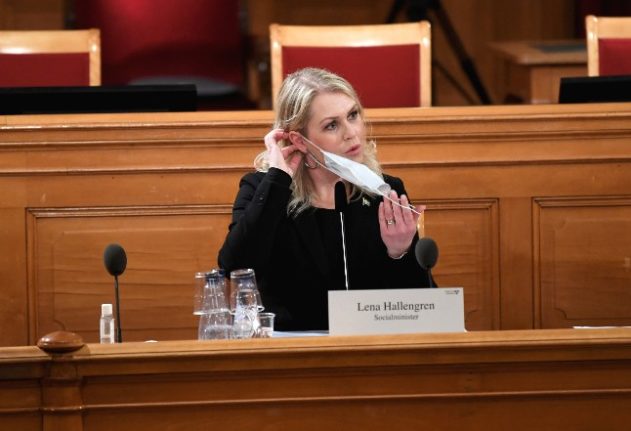But she told the Committee of the Constitution that the government had brought in the measures they believed had been necessary at all stages in the pandemic.
“Whether that has been sufficient, is not a judgement that I can sit here and make,” she said.
During her questioning, Hallengren was asked several times why the government had never formally decided on a strategy, with several MPs expressing surprise and wondering aloud how health and other agencies could have been controlled by the government without a strategy.
“How can the government run the country in the biggest crisis in modern times without having set a strategy,” Tobias Billström, group leader of the opposition Moderate Party, told the TT newswire.
“If you don’t have one, how can you expect to have different agencies working together towards the same goal? This raises far more questions that we had at the start [of the committee’s inquiry].”
Hallengren said that it was not unusual for a country to lack a formal government strategy, pointing out that neither Germany, France nor Italy had one.
The committee’s inquiry is likely to give the Swedish government’s handling of the pandemic a different, and certainly more political, type of scrutiny than the independent Coronavirus Commission, which initially had a very narrow remit, with the first phase of its investigation limited to the handling of the pandemic in the elderly care sector.
The inquiry was called by Tobias Billström, group leader of the opposition Moderate party and the committee, the most powerful in the Swedish parliament, is headed by the Moderate MP Karin Enström, Minister of Defence from 2012 to 2014.
After the hearing, Hallengren revealed that she has been diagnosed with breast cancer, had an operation a month ago, and will begin chemotherapy on Monday. She said that she felt well and intended to continue working if possible, but realised that if this becomes too difficult in the coming weeks and months she may have to go on sick leave.
READ ALSO: What can the parliament’s inquiry tell us about Sweden’s coronavirus strategy?
In the hearing, Hallengren said that her government had set coronavirus policy on the basis of a few overarching goals.
“We should put lives and health first, protect the healthcare system as much as we can, and make sure that they have the resources they need.
“But we have also stressed the importance of securing society’s other important functions. We believe that once this pandemic is over, society should be able to continue to function.”
Part of this final goal had meant, she said, that the government had tried to protect jobs and also make sure that people’s private lives were not affected “overly much”, adding that in spring this approach had enjoyed broad support in the country.
“There’s nothing particularly strange or mystical about the Swedish strategy,” she went on, questioning the focus on what the Swedish strategy has been.
Hallengren argued that it had been impossible to predict at the start of the pandemic how quickly there would be shortages of personal protective equipment such as masks, gloves and visors for health personnel.
“No one made a judgement that they would run out in 2-3 weeks,” she said.
Tuve Skånberg, from the Christian Democrats, and Ida Drougge, from the Moderates, both asked why the government had not responded to the shortages in protective equipment by taking tougher measures to reduce the level of transmission in society.
“We did everything we could to get hold of protective equipment and push down on infection rates,” Hallengren replied.
She said that the government had been surprised and worried by the fact that it took until nearly last summer before testing rates reached hoped-for levels, something Sweden’s regions have blamed on uncertainties over funding.
“I don’t accept the description that this came down to a lack of money,” Hallengren said, noting that the government had already on April 2nd pledged a billion Swedish kronor for testing, although she conceded that the government could have reached an agreement with the regions on the issue earlier.
She also denied that the decision to limit testing at the start of the pandemic was evidence that Sweden had hoped to achieve herd immunity.
“There was never any idea about letting a lot of people get infected so long as they didn’t become too sick. That was never a part of the Swedish strategy. If it had been we would have been able to miss out on a lot of measures which we imposed.”


 Please whitelist us to continue reading.
Please whitelist us to continue reading.
It’s extremely rare that I praise a Swedish social-democratic politician, but I wrote already last year here in The Local that I was surprisingly impressed by Lena Hallengren. And I haven’t changed my mind.
On the whole I think she’s managed her part of the pandemic crisis well, in close cooperation of course with Folkhälsomyndigheten and many others. Nothing has been perfect, but neither has it been anywhere in the entire world. I saw only short parts of the KU questioning on Friday, but there seemed to be a lot of ‘hindsight wisdom’ coming from the members sitting in the comfort of their desks in the chamber, and that Hallengren in general performed well.
I would even venture to say that she’s a potential candidate for the job as next Swedish prime minister. There are certainly quite a few out there who would be a worse choice…
Good luck to Lena Hallengren with her forthcoming chemotherapy.